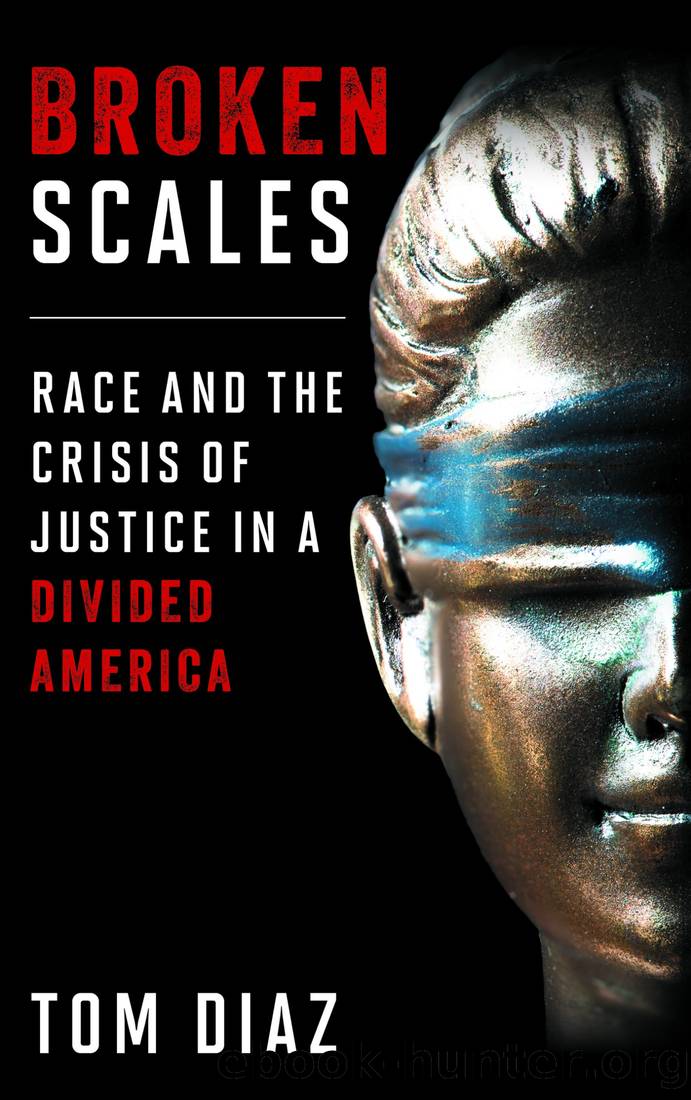Broken Scales by Tom Diaz

Author:Tom Diaz [Diaz, Tom]
Language: eng
Format: epub
Tags: undefined
ISBN: 9781538138502
Publisher: RowmanLittlefield
Published: 2012-09-15T00:00:00+00:00
This stubborn fact of federalism and local control alone should give pause to any who believe that the U.S. Congress or the president can effect sweeping changes in the American criminal justice system by law or decree.
Like those of other states, the Georgia criminal justice system is distinct from and independent of the federal system (except for the ideologically variable federal oversight of constitutional protections, which has historically run hot and cold). State and local justice systems process the vast majority of crimes in America, from simple assault to murder. Although the states differ in the details of their definitions of crimes and the procedures they use to enforce their laws, their criminal justice systems are a brood of almost-identical twins.
Textbook definitions of âthe lawâ often project the majestic image of a finely geared, well-tuned, up-to-date, rational, and objective system for dispensing even-handed justice. âNo one is above the lawâ in the sober courts of this magnificent world. In fact, legal systems are mechanically more like hybrid engines sprung from the minds of steampunk geniuses. Subjectivity, privilege, expediency, economics, politics, and informal discretion affect each of the elements, from the creation of its parts (laws and procedure) to their daily operation (enforcement and adjudication).
Some ancient parts embedded within the machinery of the American legal system have been worn smooth over time. Many modern legal concepts and procedures were fashioned eons ago, passed through the forge of English common law, and finally shaped and blended by the peculiarities of Americaâs history and its evolving culture. âLegal history is a story which cannot be begun at the beginning,â the English legal historian Theodore Plucknett wrote a century ago. âHowever remote the date at which we start, it will always be necessary to admit that much of the still remoter past that lies behind it will have to be considered as directly bearing on the later history.â[13] The legal systems of Greece, Assyria, Egypt, and Rome, as well as the religious codes of Judaism and Christianity, left lasting marks on the American legal system.
So did the requisites of slavery and the meanness of Jim Crow racism.
Legal systems âdo not come from outer space,â observed legal historian Lawrence Friedman.[14] They are the products of specific societies. âBehind the law, and above it, enveloping it, is society.â[15] Laws and how they are enforced are the product of collective decisions by specific societies. They vary over time and place, responsive to cultural changes and regional differences. The antebellum legal system in America accommodated and facilitated slavery and disparate racial treatment, most extensively but not exclusively in the South. The Jim Crow legal system that followed deliberately attacked the exercise of equal rights by people of color throughout America.
These collective decisions about legal systems by societies are not made through egalitarian democracy exercised by a cheerful yeomanry. âNot everybody is part of the collective that makes the decision,â Friedman observed. âWhen we say âsocietyâ we really mean those who call the tunes and pay the piper. It
Download
This site does not store any files on its server. We only index and link to content provided by other sites. Please contact the content providers to delete copyright contents if any and email us, we'll remove relevant links or contents immediately.
Cecilia; Or, Memoirs of an Heiress — Volume 1 by Fanny Burney(32538)
Cecilia; Or, Memoirs of an Heiress — Volume 2 by Fanny Burney(31935)
Cecilia; Or, Memoirs of an Heiress — Volume 3 by Fanny Burney(31925)
The Great Music City by Andrea Baker(31911)
We're Going to Need More Wine by Gabrielle Union(19032)
All the Missing Girls by Megan Miranda(15925)
Pimp by Iceberg Slim(14476)
Bombshells: Glamour Girls of a Lifetime by Sullivan Steve(14046)
For the Love of Europe by Rick Steves(13868)
Talking to Strangers by Malcolm Gladwell(13341)
Norse Mythology by Gaiman Neil(13332)
Fifty Shades Freed by E L James(13228)
Mindhunter: Inside the FBI's Elite Serial Crime Unit by John E. Douglas & Mark Olshaker(9313)
Crazy Rich Asians by Kevin Kwan(9271)
The Lost Art of Listening by Michael P. Nichols(7487)
Enlightenment Now: The Case for Reason, Science, Humanism, and Progress by Steven Pinker(7303)
The Four Agreements by Don Miguel Ruiz(6739)
Bad Blood by John Carreyrou(6609)
Weapons of Math Destruction by Cathy O'Neil(6260)
